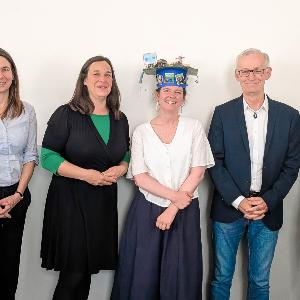Dr. Marie Aschenbrenner has successfully defended her PhD!
3 Sept 2025
She researched the role of ethics and normativity in urban environmental projects and negotiations.
3 Sept 2025
She researched the role of ethics and normativity in urban environmental projects and negotiations.

Congratulations to Dr. Marie Aschenbrenner on her successful PhD defense!
How should we live together in the city in ways that respect both one another and the environment? As cities grow and pressures on natural resources rise, this question becomes ever more urgent. But there isn’t a simple answer to what makes a “good” or “ethical” urban life. These discussions are always shaped by complex social dynamics, competing ideas, and contested politics.
Marie Aschenbrenner dedicated her PhD, under the supervision of Prof. Gordon Winder, to understanding the role of ethics and normativity in urban environmental projects and negotiations. Her research focused on Auckland, Aotearoa New Zealand, where the Hauraki Gulf / Tīkapa Moana lies at the center of social, cultural, ecological, and economic tensions. Starting from an innovative marine spatial planning process, she examined how diverse imaginaries and discourses come together when people ask: how can we live well with the Gulf?
Marie analyzed a range of settings in Auckland where coastal and marine changes were being discussed using an ethical vocabulary. Conducting expert and narrative interviews, participant observations, and analysis of media and documents, she identified two important ways people are rethinking their relationship with the Gulf:
At the same time, Marie found that these perspectives often clash with two more established discursive strands:
Marie further looked into how ethics are used in urban governance where urban dwellers are encouraged to take responsibility for the health of their “urban ecosystem”. In addition, she analyzed a local approach on Waiheke Island to put ahu moana (ocean care) into practice. This co-management model brings together Māori environmental guardianship (kaitiakitanga), with community-led efforts to restore coastal ecosystems.
Her findings show that ethics function in diverse, often contradictory ways. They can act as tools of governance, ways to discipline citizens, or strategies for building consensus. But they can also serve as bridges between worldviews, and – when connected to Indigenous ethical principles – push for change, challenge established norms and support new ways of managing resources. Ethics shape who is legitimate, who participates in decision-making and how we imagine more inclusive and sustainable urban futures.